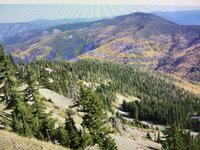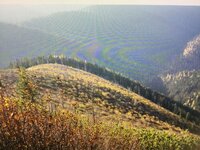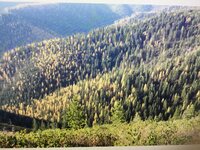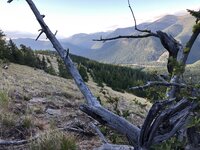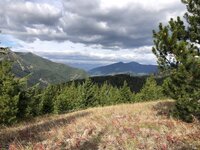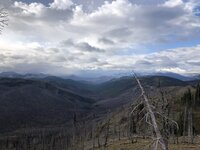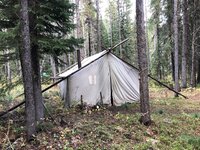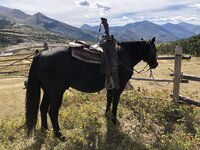Care to divulge who the guide was?i have
i went two years in a row and decided to cancel my last year with conflicting info on the guide i requested. i hunted solo in Thompson river and had a blast.
Navigation
Install the app
How to install the app on iOS
Follow along with the video below to see how to install our site as a web app on your home screen.
Note: This feature may not be available in some browsers.
More options
Style variation
You are using an out of date browser. It may not display this or other websites correctly.
You should upgrade or use an alternative browser.
You should upgrade or use an alternative browser.
Elk Hunting Montana Outfitters
- Thread starter gwalsh8
- Start date
strattonje2020
WKR
- Joined
- Jan 30, 2020
- Messages
- 476
i wanted nate. He is the best guide.Care to divulge who the guide was?
derek was my first year and he is a fun guy but it was his first year and didn't know the area.
second year i dont even recall his name but i knew he was a meat packer the previous.
this year they said they would give me a "walker". and give me nate the second week. so i decided to hunt alone and was succesful.
what week were you there? i hunted the area of the camp they have up the river. its all public land. i actually seen the elk creek guys road hunting most days out there.
I had roughly the same experience in the Bob in September. I was the only guy in camp to have an opportunity at an elk (profile pic). While I will be forever grateful for the hunt, nobody else in camp (7 other hunters) had any opportunities on deer, bears, or wolves in 6 full days of hard hunting. We saw a total of 12 deer, 2 elk, 1 black bear, 1 grizz and cub, and a dozen grouse.
Spectacular views and beautiful, wild, tough country up there for sure. Just extremely low on game where we were west of Swift Dam. That being said, if a guy wanted to pay for a hunt on the reservation, the hunting sounds much better to the north. Look up member jordanrw23 for more information.
Spectacular views and beautiful, wild, tough country up there for sure. Just extremely low on game where we were west of Swift Dam. That being said, if a guy wanted to pay for a hunt on the reservation, the hunting sounds much better to the north. Look up member jordanrw23 for more information.
I just looked at price list for MTO.
$8,000 for 2x1 general elk + $3,000 trophy fee. Uf-dah...
$8,000 for 2x1 general elk + $3,000 trophy fee. Uf-dah...
Oh you are talking about Elk Creek...i should have asked the outfitting group, not the guide itself. We had Derek and thought he was pretty good with knowing the area and stuff, he said this was his 3rd or 4th year. He sure walks and fast, we had to tell him a few times to slow down. We hunted Nov 13-18th. We did drive in the truck a good bit but only to get to spots we would walk or spot from not truly road hunting...I know some of them did though.i wanted nate. He is the best guide.
derek was my first year and he is a fun guy but it was his first year and didn't know the area.
second year i dont even recall his name but i knew he was a meat packer the previous.
this year they said they would give me a "walker". and give me nate the second week. so i decided to hunt alone and was succesful.
what week were you there? i hunted the area of the camp they have up the river. its all public land. i actually seen the elk creek guys road hunting most days out there.
strattonje2020
WKR
- Joined
- Jan 30, 2020
- Messages
- 476
i know for a fact these guys takes bets on who shoots the smallest animal wins the pot etc. they also laugh about walking people into he ground day one so they can put you in a tree stand and they can sit all day.i wanted nate. He is the best guide.
derek was my first year and he is a fun guy but it was his first year and didn't know the area.
second year i dont even recall his name but i knew he was a meat packer the previous.
this year they said they would give me a "walker". and give me nate the second week. so i decided to hunt alone and was succesful.
what week were you there? i hunted the area of the camp they have up the river. its all public land. i actually seen the elk creek guys road hunting most days out there.
did y’all even see an elk?Oh you are talking about Elk Creek...i should have asked the outfitting group, not the guide itself. We had Derek and thought he was pretty good with knowing the area and stuff, he said this was his 3rd or 4th year. He sure walks and fast, we had to tell him a few times to slow down. We hunted Nov 13-18th. We did drive in the truck a good bit but only to get to spots we would walk or spot from not truly road hunting...I know some of them did though.
Thats pretty shitty of them.i know for a fact these guys takes bets on who shoots the smallest animal wins the pot etc. they also laugh about walking people into he ground day one so they can put you in a tree stand and they can sit all day.
did y’all even see an elk?
No we didnt see an elk the entire trip but Derrek said he did the one day. Honestly I only saw little sign in the way of scat and elk tracks. I just dont think the area holds many elk at all. We were in the river camp half of the trip and Boss told us we were more likely to see mule deer (which was more what I and my dad wanted since we already shot elk). He was right I dont think any elk sign was seen there it was the other days we hunted closer to the main camp that we saw some. Again in my experience I think Derrek and my dads guide legitimately tried their best given the number of animals in the area.
All I can say is a decade ago plus that country around noxon was incredible prior to wolves every drainage held multiple 350 bulls and you could let little bulls walk knowing you had a very good opportunity at a quality bull and would see large groups of cows on ancient trails about every day….not so much any longer…..one buddy still hunting it saw 13 wolves out of trout creek this year alone.
- Banned
- #29
Most of the elk in the area live on a ranch about 2 minutes from my house off highway 206...lol!Thats pretty shitty of them.
No we didnt see an elk the entire trip but Derrek said he did the one day. Honestly I only saw little sign in the way of scat and elk tracks. I just dont think the area holds many elk at all. We were in the river camp half of the trip and Boss told us we were more likely to see mule deer (which was more what I and my dad wanted since we already shot elk). He was right I dont think any elk sign was seen there it was the other days we hunted closer to the main camp that we saw some. Again in my experience I think Derrek and my dads guide legitimately tried their best given the number of animals in the area.
We had a guy in camp that hunted the Bob 15 years ago. On that trip 4/8 hunters shot bulls over 275 and 3 of them shot nice mule deer bucks. He said they saw animals every day.All I can say is a decade ago plus that country around noxon was incredible prior to wolves every drainage held multiple 350 bulls and you could let little bulls walk knowing you had a very good opportunity at a quality bull and would see large groups of cows on ancient trails about every day….not so much any longer…..one buddy still hunting it saw 13 wolves out of trout creek this year alone.
Fast forward to Sep 2021 on his return trip and he couldn’t believe the total lack of animals in the same area.
Guides universally blame wolf predation and hazing of the elk out of traditional areas.
strattonje2020
WKR
- Joined
- Jan 30, 2020
- Messages
- 476
I seen an article the other day that Montana FWP thinks that the state is over objective in many areas. I think NW is even considered over objective.We had a guy in camp that hunted the Bob 15 years ago. On that trip 4/8 hunters shot bulls over 275 and 3 of them shot nice mule deer bucks. He said they saw animals every day.
Fast forward to Sep 2021 on his return trip and he couldn’t believe the total lack of animals in the same area.
Guides universally blame wolf predation and hazing of the elk out of traditional areas.
I know wolves were brought up several times by different people on the trip. I know they are elusive but none were seen all week that Im aware of, they probably have moved on as well. As some of you know, that area is very nice country and shouldnt have an issue holding plenty of animals. Its such large tracts of public land and some good habitat which is such a shameWe had a guy in camp that hunted the Bob 15 years ago. On that trip 4/8 hunters shot bulls over 275 and 3 of them shot nice mule deer bucks. He said they saw animals every day.
Fast forward to Sep 2021 on his return trip and he couldn’t believe the total lack of animals in the same area.
Guides universally blame wolf predation and hazing of the elk out of traditional areas.
strattonje2020
WKR
- Joined
- Jan 30, 2020
- Messages
- 476
Ya i keep going back because its part of the challenge. Id hate to shoot an elk on someone's ranch now. If you want to hunt whitetails your could easily see 20 plus a day though.I know wolves were brought up several times by different people on the trip. I know they are elusive but none were seen all week that Im aware of, they probably have moved on as well. As some of you know, that area is very nice country and shouldnt have an issue holding plenty of animals. Its such large tracts of public land and some good habitat which is such a shame
I give you tons of props for the dont give up attitude. I dont necessarily only consider a hunt successful if I get game but I dont know how many years I could do it not seeing much of anything and keep coming back. Obviously just because that was my experience in specific locations doesnt mean you are seeing the same so I understand.Ya i keep going back because its part of the challenge. Id hate to shoot an elk on someone's ranch now. If you want to hunt whitetails your could easily see 20 plus a day though.
I found it funny one of the hunters sat there during dinner complaining to one of the other hunters talking about not seeing game and what not...then a little later I saw him signing up for next year already. Again I think the outfit and the guides I talked to and hunted with seemed to be good guys but I wouldnt go back to that area again. I dont need to have animal stomping over me but to see an elk or more than a couple handful of deer in 6 days would have been nice
Doc Holliday
WKR
- Joined
- Jun 15, 2016
- Messages
- 3,043
Hopefully he killed all 13All I can say is a decade ago plus that country around noxon was incredible prior to wolves every drainage held multiple 350 bulls and you could let little bulls walk knowing you had a very good opportunity at a quality bull and would see large groups of cows on ancient trails about every day….not so much any longer…..one buddy still hunting it saw 13 wolves out of trout creek this year alone.
This is an area pre wolves you could go into in September and hear 10-15 bulls everyday….as noted sad to see large expansive awesome country lacking in game….i still go to my old Idaho haunts wishing and living off memories but time to find a new area unless I like throwing my money away
Attachments
- Banned
- #38
Guides always need an excuse.We had a guy in camp that hunted the Bob 15 years ago. On that trip 4/8 hunters shot bulls over 275 and 3 of them shot nice mule deer bucks. He said they saw animals every day.
Fast forward to Sep 2021 on his return trip and he couldn’t believe the total lack of animals in the same area.
Guides universally blame wolf predation and hazing of the elk out of traditional areas.
Never mind the fact there's over 1 million people living in Montana now. Never mind the long range capable rifles their clients have now. Range finders, spotting scopes that you judge elk/deer with at 3-4 miles, high quality glass, trail cams, tons more outfitters all across the State.
Did they mention the 6 months of elk seasons now compared to 15 years ago? Issuing B-tags for a second elk in many areas? Did they mention the Elk Management Plan, or how the objective numbers were decided? How about Debby Barretts elk slaughter bill?
How about 11 weeks of general OTC opportunity in a vast majority of the State for the 130K plus Residents? What about the 17K NR elk tags? What about outfitters crying to the legislature and getting even more NR tags this year?
How about the severely reduced lion quota's in most all of NW Montana? Permit only for lions now, that come up?
Probably not would be my guess...
Its all the wolves fault.
Their focus was on predators and primarily on wolves. They were very negative about the reintroduction of wolves in the late 90s in Yellowstone and Central ID, because the wolves were never eliminated in NW MT in the first place and numbers were already expanding naturally prior to reintroduction. In their view, the reintroduction and inevitable population explosion broke the predator/prey balance that had existed for decades prior. Below is an excerpt from an article in Outside magazine from 2015.
"...by 1988 there were 30 wolves living along the North Fork of the Flathead River, in and around Montana’s Glacier National Park.
But even with the protections, growth of the border population was slow. Wolf activists began pushing for a more proactive approach, arguing that the Endangered Species Act (ESA) obligated Fish and Wildlife to restore “experimental populations” of endangered species wherever they had been eliminated, as long as there was suitable habitat. Yellowstone and the central Idaho wilderness areas offered more than 40,000 square miles of ideal wolf terrain, with few people, fewer roads, and lots of wild ungulates for the wolves to eat. The idea enraged ranchers and hunters, who prophesied a bloodbath of livestock and game, but it gained traction swiftly among scientists and environmentalists.
Seventy-eight-year-old Bob Ream, who at the time was director of the Wolf Ecology Project at the University of Montana and a member of the federally appointed recovery team for the Northern Rockies, also opposed the plan. At the rate wolves were already reproducing in Montana, Ream was confident that they would make their way to Yellowstone and central Idaho without any help. But his opposition wasn’t purely scientific.
“The reintroduction, more than anything, really polarized the issue here in the West,” Ream told me last May at his home in Helena. “I think westerners dislike the federal government, but I think they tended to view the natural recovery as sort of an act of God. Whereas the reintroduction was, ‘Those goddamn federal bureaucrats jamming it down our throat again.’ ”
After a fierce political battle and a six-year environmental impact statement (EIS) process, the reintroduction camp won. Over two winters in 1995 and 1996, the U.S. Fish and Wildlife Service* captured 66 wolves in Alberta and British Columbia and then released them in Yellowstone and central Idaho. The Northern Rocky Mountain Wolf Recovery Plan set the threshold for recovery at 100 wolves in each region, with ten breeding pairs producing pups for three successive years. The plan was later revised to include northwest Montana’s naturally recovering population, and the targets were raised to 150 wolves and 15 breeding pairs in each area. With abundant prey and no rival wolf packs, the transplanted wolves doubled their numbers every year for the next three years. The wolf explosion delighted environmentalists and confirmed the worst fears of ranchers and hunters.
Twenty years after reintroduction, there are at least 1,700 wolves in Montana, Idaho, and Wyoming combined—more than five times the original threshold for recovery under the ESA."
The other reason they focused on wolves, is likely because the area we hunted is somewhat insulated from pressures impacting easier areas to access in the state.
20 miles on gravel to the trailhead from nearest town- Dupuyer (118 people)
18 miles on horse from the trailhead- Swift Dam
General reputation of the Bob as thick, nasty, steep, and rough country
Our outfitter also has 30 plus years of experience hunting from the same camp in the Bob which likely gives them more hands-on experience, observations, and at least anecdotal "data" than FWP may have.
"...by 1988 there were 30 wolves living along the North Fork of the Flathead River, in and around Montana’s Glacier National Park.
But even with the protections, growth of the border population was slow. Wolf activists began pushing for a more proactive approach, arguing that the Endangered Species Act (ESA) obligated Fish and Wildlife to restore “experimental populations” of endangered species wherever they had been eliminated, as long as there was suitable habitat. Yellowstone and the central Idaho wilderness areas offered more than 40,000 square miles of ideal wolf terrain, with few people, fewer roads, and lots of wild ungulates for the wolves to eat. The idea enraged ranchers and hunters, who prophesied a bloodbath of livestock and game, but it gained traction swiftly among scientists and environmentalists.
Seventy-eight-year-old Bob Ream, who at the time was director of the Wolf Ecology Project at the University of Montana and a member of the federally appointed recovery team for the Northern Rockies, also opposed the plan. At the rate wolves were already reproducing in Montana, Ream was confident that they would make their way to Yellowstone and central Idaho without any help. But his opposition wasn’t purely scientific.
“The reintroduction, more than anything, really polarized the issue here in the West,” Ream told me last May at his home in Helena. “I think westerners dislike the federal government, but I think they tended to view the natural recovery as sort of an act of God. Whereas the reintroduction was, ‘Those goddamn federal bureaucrats jamming it down our throat again.’ ”
After a fierce political battle and a six-year environmental impact statement (EIS) process, the reintroduction camp won. Over two winters in 1995 and 1996, the U.S. Fish and Wildlife Service* captured 66 wolves in Alberta and British Columbia and then released them in Yellowstone and central Idaho. The Northern Rocky Mountain Wolf Recovery Plan set the threshold for recovery at 100 wolves in each region, with ten breeding pairs producing pups for three successive years. The plan was later revised to include northwest Montana’s naturally recovering population, and the targets were raised to 150 wolves and 15 breeding pairs in each area. With abundant prey and no rival wolf packs, the transplanted wolves doubled their numbers every year for the next three years. The wolf explosion delighted environmentalists and confirmed the worst fears of ranchers and hunters.
Twenty years after reintroduction, there are at least 1,700 wolves in Montana, Idaho, and Wyoming combined—more than five times the original threshold for recovery under the ESA."
The other reason they focused on wolves, is likely because the area we hunted is somewhat insulated from pressures impacting easier areas to access in the state.
20 miles on gravel to the trailhead from nearest town- Dupuyer (118 people)
18 miles on horse from the trailhead- Swift Dam
General reputation of the Bob as thick, nasty, steep, and rough country
Our outfitter also has 30 plus years of experience hunting from the same camp in the Bob which likely gives them more hands-on experience, observations, and at least anecdotal "data" than FWP may have.
- Banned
- #40
The elk they hunt never get a break, they don't winter in the Bob...if only obviously.Their focus was on predators and primarily on wolves. They were very negative about the reintroduction of wolves in the late 90s in Yellowstone and Central ID, because the wolves were never eliminated in NW MT in the first place and numbers were already expanding naturally prior to reintroduction. In their view, the reintroduction and inevitable population explosion broke the predator/prey balance that had existed for decades prior. Below is an excerpt from an article in Outside magazine from 2015.
"...by 1988 there were 30 wolves living along the North Fork of the Flathead River, in and around Montana’s Glacier National Park.
But even with the protections, growth of the border population was slow. Wolf activists began pushing for a more proactive approach, arguing that the Endangered Species Act (ESA) obligated Fish and Wildlife to restore “experimental populations” of endangered species wherever they had been eliminated, as long as there was suitable habitat. Yellowstone and the central Idaho wilderness areas offered more than 40,000 square miles of ideal wolf terrain, with few people, fewer roads, and lots of wild ungulates for the wolves to eat. The idea enraged ranchers and hunters, who prophesied a bloodbath of livestock and game, but it gained traction swiftly among scientists and environmentalists.
Seventy-eight-year-old Bob Ream, who at the time was director of the Wolf Ecology Project at the University of Montana and a member of the federally appointed recovery team for the Northern Rockies, also opposed the plan. At the rate wolves were already reproducing in Montana, Ream was confident that they would make their way to Yellowstone and central Idaho without any help. But his opposition wasn’t purely scientific.
“The reintroduction, more than anything, really polarized the issue here in the West,” Ream told me last May at his home in Helena. “I think westerners dislike the federal government, but I think they tended to view the natural recovery as sort of an act of God. Whereas the reintroduction was, ‘Those goddamn federal bureaucrats jamming it down our throat again.’ ”
After a fierce political battle and a six-year environmental impact statement (EIS) process, the reintroduction camp won. Over two winters in 1995 and 1996, the U.S. Fish and Wildlife Service* captured 66 wolves in Alberta and British Columbia and then released them in Yellowstone and central Idaho. The Northern Rocky Mountain Wolf Recovery Plan set the threshold for recovery at 100 wolves in each region, with ten breeding pairs producing pups for three successive years. The plan was later revised to include northwest Montana’s naturally recovering population, and the targets were raised to 150 wolves and 15 breeding pairs in each area. With abundant prey and no rival wolf packs, the transplanted wolves doubled their numbers every year for the next three years. The wolf explosion delighted environmentalists and confirmed the worst fears of ranchers and hunters.
Twenty years after reintroduction, there are at least 1,700 wolves in Montana, Idaho, and Wyoming combined—more than five times the original threshold for recovery under the ESA."
The other reason they focused on wolves, is likely because the area we hunted is somewhat insulated from pressures impacting easier areas to access in the state.
20 miles on gravel to the trailhead from nearest town- Dupuyer (118 people)
18 miles on horse from the trailhead- Swift Dam
General reputation of the Bob as thick, nasty, steep, and rough country
Our outfitter also has 30 plus years of experience hunting from the same camp in the Bob which likely gives them more hands-on experience, observations, and at least anecdotal "data" than FWP may have.
Those elk are subjected to all the things I listed, I don't care how far from the road they are when you hunted them for the week you were there.
For the record, how much sense does it make to continue to pound on the remaining wildlife that is left in the Bob? No matter the cause?
There's some awesome "management" for you...
Last edited:
Similar threads
Featured Video
Latest Articles
- TT#64 Josh Boyd Elk Hunting Strategies for Every Season
- Aaron Davidson of Gunwerks
- Spring Black Bears with Joe Kondelis
- BIG Buck Stories with the Dirty Giants Podcast
- TT#62 Brian Barney Hunting Bulls without Calling
- Hoyt Alpha AX-2 SD Review
- Kuiu Kenai vs Outdoor Vitals Vario Hooded Jacket Review
- Hoyt RX-9 Ultra Review
- Hunting Vampire Bucks & Building an Optics Kit
- Darton Sequel ST2 35 Review

